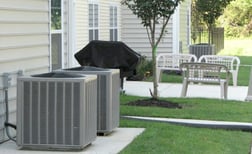What is a heat pump?
In its most basic form, a heat pump acts very much like a refrigerator. When it's cold outside, a heat pump pulls exterior heat inside. When it's warm outside, it reverses directions and acts like an air conditioner, removing heat from your home. A compressor circulates refrigerant that absorbs and releases heat as it travels between the indoor and outdoor units. The indoor unit is called an air handler and the outdoor unit is very similar to a central air conditioner, but is called a heat pump.
 Is there more than one type?
Is there more than one type?
Air/air collects energy from outdoor air and converts it into hot air. This type of heat pump does not work at low temperatures and cannot produce hot water. Because of this, it’s more of a supplemental heat than a primary form of heat.
Air/water converts the energy in outdoor air into heating for a water-based heating system, like a radiator or floor heating. There are a few models that will continue to function when the outdoor temperature is as low as -4°F. This type of system will produce hot water and is considered a primary heat source.
Liquid/water collects energy from the bedrock, ground, or water. Other than that, it functions just like an air/water heat pump, but is more efficient at low temperatures. This type of heat pump is called geothermal heat.
Exhaust air recycles energy from the home's ventilation air and returns it to the heating system. This type uses the air that’s already in the home. It can be extremely cost effective, but it can’t be the main supplier of heat and hot water.
Lifespan, Upkeep and Efficiency
As with all products, the lifespan will vary. However, an air/water or liquid/water heat pump from a reputable manufacturer should last between 20 and 30 years. Heat pumps, if correctly installed, require little maintenance.
An advantage of a heat pump is that instead of generating heat, it moves heat which greatly increases your energy efficiency. Another thing to keep in mind is that heat pumps are powered by electricity; you can save quite a bit of money on annual fuel consumption. With all of these positives, it is no wonder that heat pumps are rapidly becoming the most common choice for new and existing homes!

